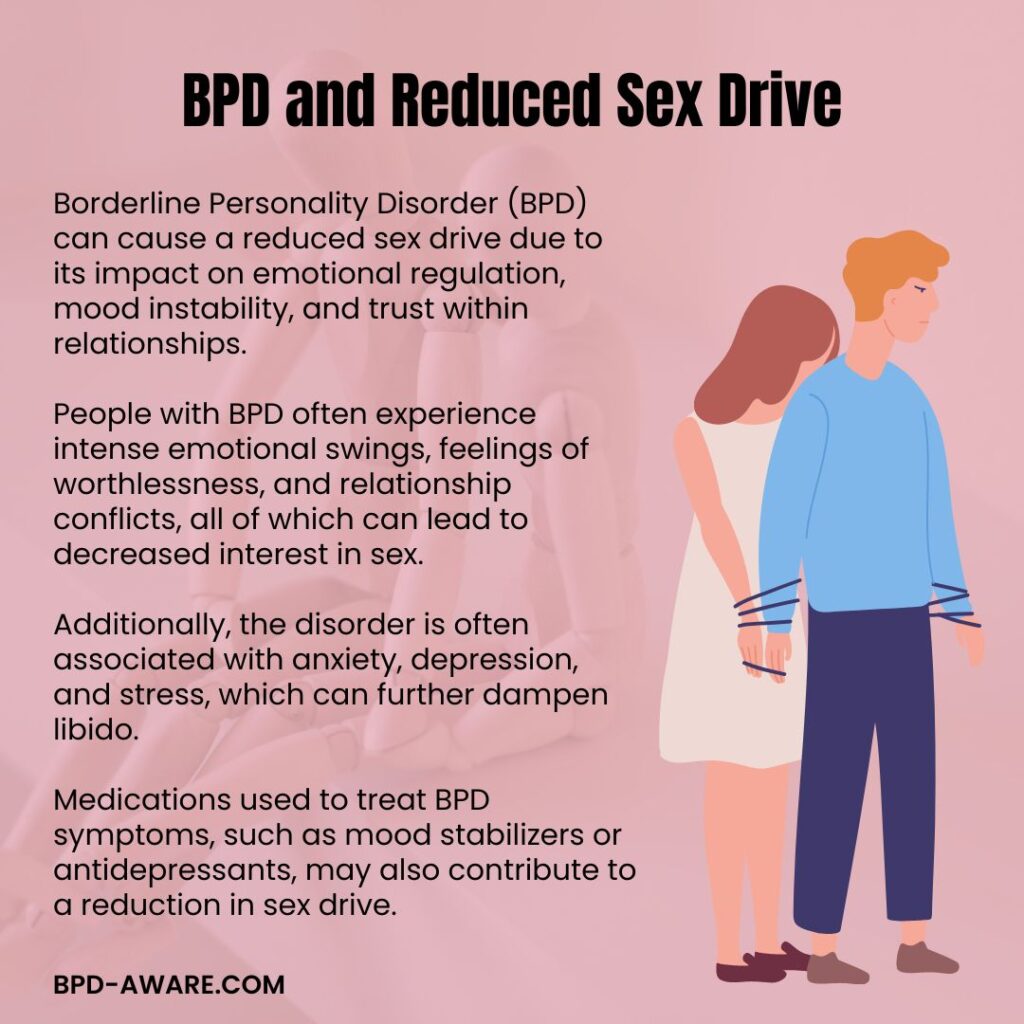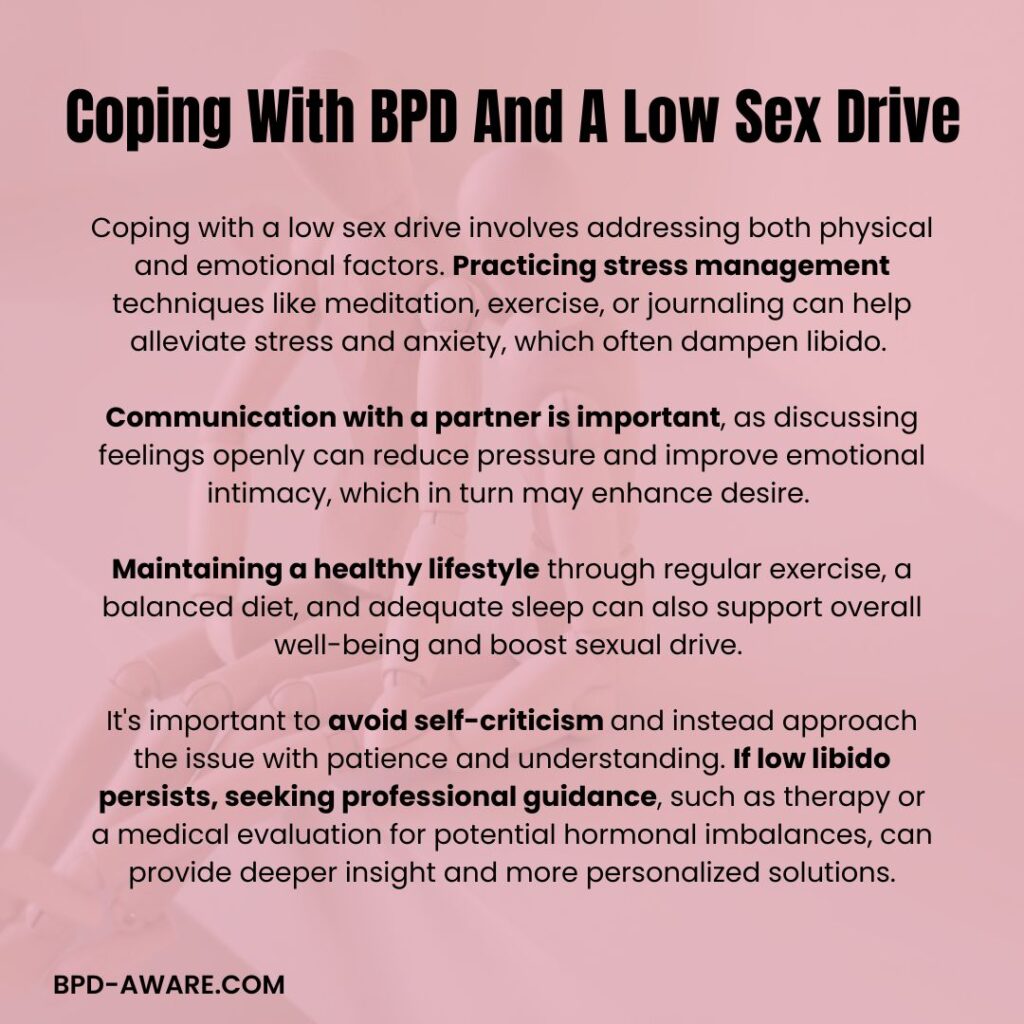In a previous article, we discussed how hypersexuality can be a symptom of borderline personality disorder (BPD). Hypersexuality is when someone is excessively preoccupied with sexual thoughts, urges, or behaviors that interfere with their life.
While it’s true that some people with BPD experience hypersexuality as part of their condition, the reverse can also be true. Other people with borderline personality disorder may experience a reduced sex drive compared to the average person. This lowered sex drive can vary from a slight reduction to a complete loss of sexual desire.
A low sex drive can affect anyone of any age or gender with borderline personality disorder. This reduced sexual desire can be temporary, but sometimes it can be a long-term issue. A loss of sex drive can at times affect people who are typically hypersexual.
In this article, we’ll look at the reasons why someone with BPD might experience a lower sex drive, how this can affect relationships and self-image, the importance of self-care, and coping strategies.
BPD and the Factors that Contribute to a Lowered Sex Drive
One of the hallmarks of borderline personality disorder is emotional dysregulation. Emotional dysregulation is the inability to manage and respond to emotional experiences in a manner appropriate to the situation. For example, someone with BPD might become incredibly angry after their message went unanswered for more than a couple of minutes, something that wouldn’t bother most people.
Living this way creates an emotional rollercoaster and a large amount of stress. These, in turn, can cause a great deal of fatigue. When you’re tired, your sex drive can plummet until you feel well-rested again.
People with BPD also often experience a fear of abandonment or rejection or a fear of intimacy. They may also find it difficult to trust their partner fully. These fears can create a sort of mental block around sex. They may subconsciously raise their “defensive shields” and protect themselves from their greatest fears. This again can result in a greatly diminished desire for sex.
Low self-esteem and body image issues can also play a significant factor. Many people with BPD experience low self-esteem or wild swings in their levels of self-esteem. When you don’t believe yourself to be worthy of love or pleasure, it’s easy to see why the desire for sex could become lower. Likewise, those with body image issues may develop deep anxiety surrounding their bodies and not want to be seen naked. This makes lovemaking a scary and unattractive proposition for them.
Something else to consider is the past trauma that some people with BPD have experienced, particularly when this trauma is sexual. When sex is tied to past abuse and trauma, it’s entirely normal for the victim to have difficulties concerning sex, trust, and intimacy. This can result in hypersexuality or a greatly reduced desire for sex.
Medication can also play a role in having a reduced sex drive. Many of the medications used to help treat BPD can cause a lower libido than normal. These medications include antidepressants, anti-anxiety, mood stabilizers, and antipsychotics. It’s not unusual for someone with BPD to be on one or more of these types of medications.
Finally, many individuals with BPD also have a co-occurring condition on top of their personality disorder. Conditions like eating disorders, substance abuse disorders, and other personality disorders often occur on top of having borderline personality disorder. These co-occurring conditions may exacerbate all of the factors and create their own complications.
There may be no one main factor causing a low sex drive, it can be a combination of factors. There are also lifestyle factors to consider such as poor sleep quality, a lack of exercise, and an unhealthy diet.

Treatment Approaches and Coping Strategies
One of the most important things to do if you’re struggling with a lack of sexual desire is to communicate this with your partner. Make it clear that they’re not the cause and that your BPD is likely the reason. Use “I statements” such as “I’ve been feeling particularly stressed lately and it’s affecting my desire for intimacy” or “I’ve had some bad experiences in the past and they may take some time to work through.” Do your best to remain calm throughout the conversation. If your partner attempts to pressure you into having sex, this is a form of abusive behavior and you should strongly consider breaking up with them.
If you’re not already undergoing treatment for borderline personality disorder, then you may wish to consider it as therapy helps to reduce many of the symptoms that can lead to a lower sex drive. If you are already undergoing therapy, then you might want to talk about your reduced libido with your therapist. They may be able to help.
Similarly, if you’re on medication, you should discuss your low sex drive with your psychiatrist or healthcare provider, especially if you’ve noticed that your sex drive has decreased since starting a particular medication or having a dosage increased. They may switch you to another medication or offer you a medication that can boost your libido.
Self-care is also important. That means making time to relax, getting regular exercise, eating a healthy diet, getting quality sleep, and getting out in nature. You might be surprised at how big a difference this can make to your overall mental health.
Finally, remember to be compassionate towards yourself. Do not blame yourself or judge yourself for your reduced sex drive as it simply isn’t your fault. No one chooses to have BPD and none of us choose the specifics of our sex drive. Whether this lowered desire for intimacy is a blip or a long-term thing, it’s not your fault.

Final Thoughts
People with BPD often experience fluctuations in their sex drive throughout living with their condition. While hypersexuality may be common, a greatly reduced desire for intimacy can also occur.
This reduction can be caused by many factors: emotional dysregulation, stress, fear of abandonment or rejection, fear of intimacy, low self-esteem, body image issues, past trauma, co-occurring conditions, medication, and more.
For some, this low sex drive may be temporary, for others it can be more long-term.
However, some things can be done to help boost sexual desire and cope with the reduced desire in the meantime. Having honest, open communication with your partner is the foundation of any healthy relationship and can help to relieve any pressure you may be feeling.
Therapy can also be a massive help in reducing the symptoms that cause a reduced sex drive and giving you the tools to avoid negative thought patterns surrounding physical intimacy.
Self-care and compassion are also vital. Doing the best you can to take care of your physical and mental needs can make a huge difference in your overall health, and that includes your sex drive. Just as important though is to not judge or blame yourself.
You are strong, likely stronger than you realize. If you’re willing to put in the work, this is a challenge that you can overcome.
Sources, Resources, and Further Reading
- BPD & Sexuality: Understanding the Connection: https://www.choosingtherapy.com/bpd-and-sexuality/
- Understanding BPD and Sex: https://www.blueheart.io/post/borderline-personality-and-low-libido
- Impaired Sexual Function in Patients with Borderline Personality Disorder is Determined by History of Sexual Abuse: https://www.sciencedirect.com/science/article/abs/pii/S1743609515323468
- Sexual Behavior in Borderline Personality: https://pmc.ncbi.nlm.nih.gov/articles/PMC3071095/
















